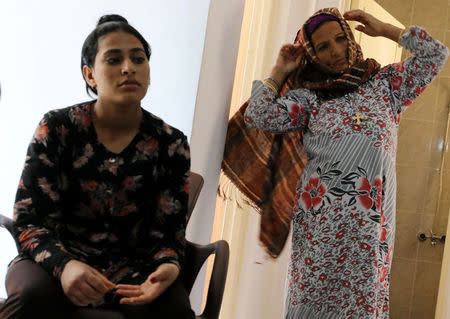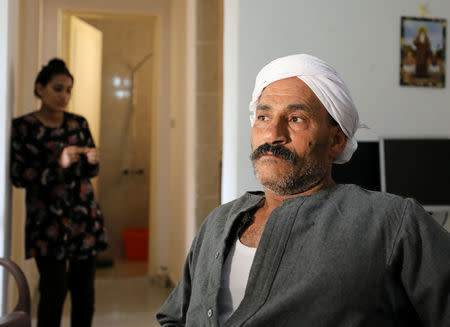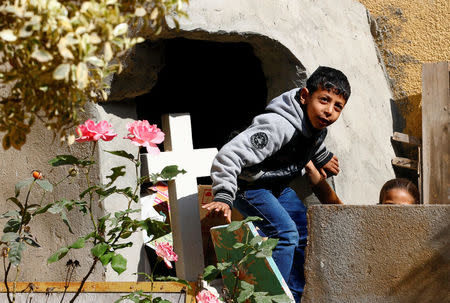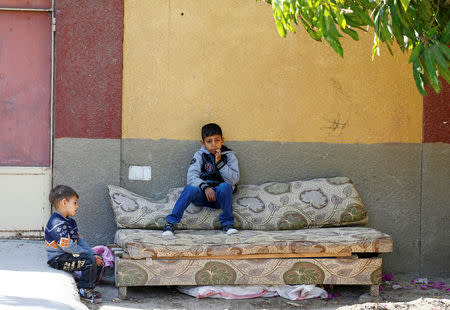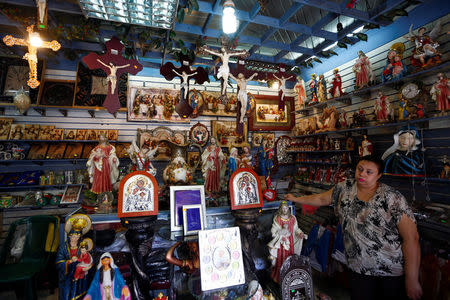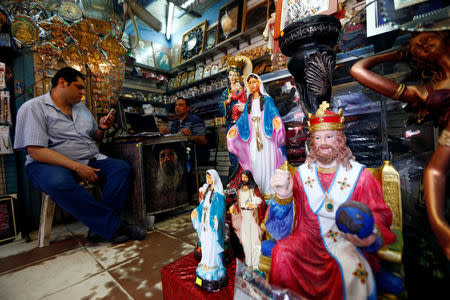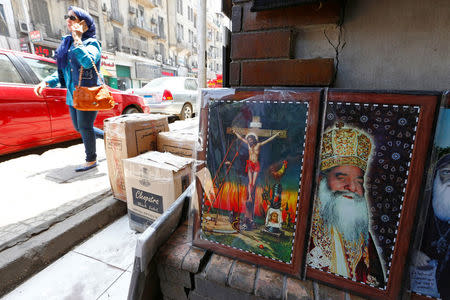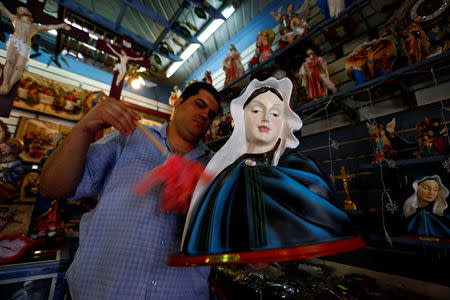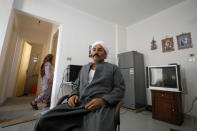Pope to visit Egypt as Copts face Islamic State campaign
By Amina Ismail ISMAILIA, Egypt (Reuters) - Karam Nassif fled his home in Egypt's North Sinai this year after his name appeared on a Christian hit-list circulated by Islamic State. Fearing for their safety after this month's twin church bombings, his family now wants to leave the country. "You've seen what happened in Tanta and Alexandria and Cairo," his wife Mervat said, referring to church attacks that have killed more than 70 people since December. "I feel that there is no hope for us at all, we have been smashed." Pope Francis flies to Cairo on Friday on a mission to mend ties with Islamic religious leaders angered by his predecessor's criticism of the treatment of Christians in Egypt. But his visit comes as Egypt's Copts, the Middle East's largest Christian community and one of its oldest, face the worst persecution in living memory at the hands of Islamic State militants, who have threatened to wipe them out. The militants, who carry out regular attacks on Egyptian security forces in North Sinai, turned their guns on Christians in December, seeking to fuel sectarian hatreds. Two church bombings killed at least 45 people on Palm Sunday, when Christians gather to celebrate Jesus' arrival in Jerusalem. A suicide bomber killed 28 people at Egypt's main cathedral before Christmas and an Islamic State campaign of murders in North Sinai prompted hundreds of Christians, including Nassif and his family, to flee in February and March. The attacks have raised fears among Copts, who comprise roughly 10 percent of Egypt's population of 92 million, that they will face the same fate as their brethren in Iraq and Syria, where Christian communities have been decimated by lengthy wars and Islamic State persecution. Egypt's Copts are among the most vocal supporters of President Fattah al-Sisi, who has vowed to crush Islamist extremism and protect Christians and declared a three-month state of emergency in the aftermath of the Palm Sunday bombings. But many Christians feel the state either does not take their plight seriously enough or is unable to protect them against determined fanatics. KNOCK ON THE DOOR In February, Islamic State militants came knocking on Nassif’s door. The family was out at the time, but fearing for their lives after Islamic State shot dead their Christian neighbor and his son and set his home ablaze, they fled the area, leaving everything behind. The family of five now lives in a rented flat provided by the church in the city of Ismailia, which sits on the west bank of the Suez Canal, about 200 km from their home in North Sinai. Desperate, Nassif and his wife have even discussed setting sail on one of the rickety boats that takes migrants illegally from the North African shore to the relative safety of Europe. "In both cases it is dangerous," Nassif said with a soft shaky voice. "Here, if we stay, we know we will die." Egypt's Copts have suffered attacks from Muslim neighbors since the 1970s, when increasingly intolerant interpretations of Islam spread across the country. Attacks are particularly common in Minya, in the south of Egypt, where disputes over church-building and inter-faith love affairs often escalate into attacks by Muslim mobs who burn down Christian homes and expel Christian families. But Islamic State's new campaign is more systematic. The group vowed in a video in December to exterminate the Copts. Its attacks, say analysts, seek to exploit pre-existing prejudices to tear away at a social fabric that has seen Muslims and Christians live together for centuries. Bishop Anba Macarius, head of the Coptic diocese in Minya, told Reuters in an interview two days after the Palm Sunday attacks that the state needed a more systematic approach to the campaign. "Dealing with every incident individually is wrong and dealing only with the symptoms is also wrong," he said. "Words of condolence and encouragement have become worn-out... People to a certain extent are bored of it... People no longer are accepting just some nice words." In Minya, where house-burnings and evictions are common, the dispute is usually settled by inter-faith reconciliation councils rather than through the criminal courts. "The state institutions didn't change their approach in dealing with sectarian violence incidents, in most cases there is a lack of accountability for perpetrators of violence, lack of rule of law and justice," said Mina Thabet, a researcher on minorities and religious freedoms at the Egyptian Commission for Rights and Freedoms. Egypt's highest Islamic authority, al-Azhar, froze all dialogue with the Catholic Church in 2011 after former Pope Benedict denounced what he called "a strategy of violence that has Christians as a target". Pope Francis is visiting Egypt to rebuild ties with that influential Islamic organization. The pope's message of inter-religious peace and tolerance is likely to be echoed both by Sisi and Grand Imam Ahmed al-Tayeb, the head of Al-Azhar, a moderate who has spoken out against Islamic State and the sectarian nature of its attacks. Sisi has staked his reputation on changing the religious discourse, demanding in 2014 wideranging reforms to counter the doctrinal foundations of Islamist extremists. But the pope's visit also comes amid growing pressure on Al-Azhar inside Egypt, where critics have said the institution is too fossilized for the task. Parliamentarians and commentators have called in recent months for Al-Azhar to be reformed. Christian clergymen have sought to calm anger among their flock and said the government is doing its best to protect them. "The police are outside on duty and of course, in the end, God is the one who protects us," Father Boutros Daniel told Reuters after Sunday mass at a Catholic church in central Cairo. "Those who want to commit evil will commit evil and those want to do good will do good, and God will protect us." (Additional reporting by Eric Knecht; Editing by Lin Noueihed and Philippa Fletcher)

